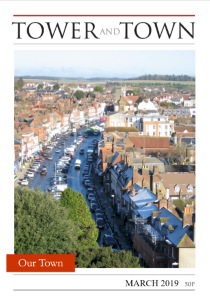

Tower and Town, March 2019 (view the full edition) (view the full edition)Drugs: Doing Less Harm: Part IIDr. Barney Rosedale and Bill Yates (ex-Oxfam), both Marlborough Quakers, were stirred into advocacy for Drug policy reform by other Quakers who visited Portugal to look into innovative drugs policies. Tony and Voirrey Faragher found that Portugal's decriminalisation of drug use in 2001 is working. Drugs-related illness and deaths have fallen. Less people are in prison for drugs-related offences. The country is now inching towards further reforms that will ultimately bring all drugs into a legally regulated regime - and incidentally, take supply out of the hands of criminals. In the last issue of T&T they looked at the international scale and consequences of the 'War on Drugs'. In this second article their focus is more particularly on the UK and on alternative policy options. Tobacco and Alcohol In Britain tobacco and alcohol are both legal. And it is because they are legal that regulation and more effective education can be put to work. A good example is the remarkable change in social habits and behaviours that has been achieved in a relatively short time by the bans on smoking in public spaces and in workplaces. Both of these drugs are addictive to different, but significant degrees and they are far more lethal than most of the illegal drugs that we moralise about. Tobacco-related disease still kills 120,000 people a year and alcohol kills 7,300. We must regard action on both of them as 'work in progress'. Perhaps we can also learn lessons that might be relevant to new policies on what are currently illegal drugs. We can also learn from the experience of an increasing number of countries and American states that are well ahead of us in reforming their drugs laws: not just Uruguay and Portugal, but Switzerland, Canada and just now, New Zealand. Perhaps we can also begin work on the long haul through the UN to lift the entire drugs supply chain out of criminal hands. Drug-related crime is an increasingly serious and urgent issue in Britain. Over the past year we have seen the surge in knife murders that are part of turf wars between rival drugs gangs. We have learned a new term: 'County Lines', that describes an illegal drugs supply system. We have heard authoritative statements by recently retired Chief Constables and by elected Police and Crime Commissioners calling for drugs policy reform. Drugs-related trials are also a burden on the overstretched judiciary. A number of our prisons are becoming ungovernable in large part because of drugs in gaols. In short our entire criminal justice system is burdened by our dysfunctional drugs policy. It is time to consider taking the entire drugs issue out of the criminal justice system and putting it in the health and medical system where it properly belongs. Regulation and Enforcement Regulation and Enforcement There are many dangers within our society, and one of the main duties of government is to protect the public. We gratefully accept the regulation which they apply, with varying degrees of competence and success, to a wide area of our lives, to fire risks of mattresses and tower blocks, to vehicles and how they are driven, to our food and our pharmaceutical drugs. If we were to abandon the idea of a 'drug-free' world, legalise these drugs and control them by detailed legal regulation, stage by stage we could take the production and supply out of the hands of criminals and into the control of medical staff. Serious drugs would be medically prescribed with registration of addicts, provision of free or subsidised pure drug and needles, supervised by trained staff, with advice on toxicity and reduction. Others would be available as pharmacy sales, restricted amounts, age restrictions, consistent dosage and full information but no advertising or branding. Licenced premises or membership clubs could supply drugs like cannabis with all the above restrictions, control of the strengths available and consumption on the premises. Some drugs might be available as licenced sales as we now buy tobacco or alcohol, but without advertising. All drugs would be taxed and this together with reduced costs to police, courts, hospitals and prisons, would, from the experience of places like Portugal, Switzerland and some USA states, more than pay for the transition to legal regulation and its enforcement. Public Opinion So why has our supposedly rational, humane and liberal government not abandoned the 'War on Drugs'? It is partly an obsession with Brexit, but more a state of public opinion, encouraged by some particular newspapers, which makes politicians think that if they move in this direction they will be thought to be 'soft on drugs' and unelectable. We need to spread the word and make it clear to our representatives that we want a more humane and sensible approach to this problem. Barney Rosedale and Bill Yates |